-
Use Cases
-
Resources
-
Pricing
World War II Timeline
(1939 - 1945)European Theater
German invasion of Poland
Sep 1, 1939
% complete
The German invasion of Poland was a military campaign that marked the beginning of World War II. It was launched on September 1, 1939, when Germany attacked Poland from the west, south, and north. The invasion lasted for a month and resulted in the swift defeat of the Polish forces. This event led to the declaration of war by France and the United Kingdom on Germany.
Image source: Invasion of Poland
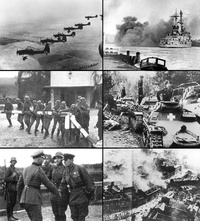
Battle of the Atlantic
Sep 3, 1939 - May 8, 1945
% complete
The Battle of the Atlantic was the longest continuous military campaign in World War II, running from 1939 to 1945. It was fought between the Allies and Axis powers, primarily the United Kingdom and Germany, in the Atlantic Ocean. The main objective of the battle was to secure the safe passage of vital supplies and reinforcements from North America to Britain, as well as to disrupt and destroy enemy shipping and submarine operations. This battle involved naval forces, merchant ships, and submarines, and it was characterized by intense convoy battles, U-boat wolfpack attacks, and strategic bombing campaigns.
Battle of Britain
Jul 10, 1940 - Oct 31, 1940
% complete
The Battle of Britain was a military campaign of the Second World War, in which the Royal Air Force (RAF) defended the United Kingdom (UK) against large-scale attacks by Nazi Germany's air force, the Luftwaffe. It is considered a significant turning point in the war. The battle took place from 10 July 1940 to 31 October 1940, and was the first major campaign to be fought entirely by air forces.
Image source: Battle of Britain
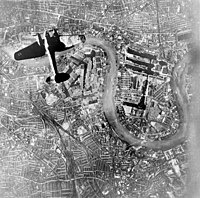
Operation Barbarossa
Jun 22, 1941 - Dec 5, 1941
% complete
Operation Barbarossa was the code name for the German invasion of the Soviet Union during World War II. It began on June 22, 1941, and ended on December 5, 1941. The operation aimed to conquer the Soviet Union and eliminate communism from Europe. The German forces initially achieved significant territorial gains but ultimately failed to achieve their objectives due to logistical challenges, harsh weather conditions, and strong Soviet resistance.
Siege of Leningrad begins
Sep 8, 1941 - Jan 27, 1944
% complete
The Siege of Leningrad was a military blockade conducted by the German Army Group North against the Soviet city of Leningrad (now Saint Petersburg) during World War II. The siege lasted for 872 days, from 8 September 1941 to 27 January 1944, and caused the deaths of an estimated 1.5 million civilians and military personnel.
Image source: Effect of siege on Leningrad

Operation Barbarossa ends
Dec 5, 1941
% complete
Operation Barbarossa was the code name for the German invasion of the Soviet Union during World War II. It began on June 22, 1941, and ended on December 5, 1941. The operation was a massive military campaign by Nazi Germany and its allies to capture Soviet territory and defeat the Soviet Union. However, the operation ultimately failed, as the harsh Russian winter and the tenacious defense of the Red Army halted the German advance. The failure of Operation Barbarossa marked a turning point in the war, as it revealed the vulnerability of the German war machine and boosted Soviet morale.
Image source: Operation Barbarossa
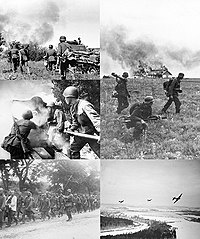
Battle of Stalingrad
Aug 23, 1942 - Feb 2, 1943
% complete
The Battle of Stalingrad was a major battle of World War II in which Nazi Germany and its allies fought the Soviet Union for control of the city of Stalingrad, now Volgograd, in southwestern Russia. The battle took place from August 23, 1942, to February 2, 1943, and is considered one of the bloodiest battles in history. It resulted in a decisive victory for the Soviets and marked a turning point in the war.
Image source: Battle of Stalingrad
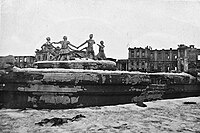
Battle of El Alamein
Oct 23, 1942 - Nov 4, 1942
% complete
The Battle of El Alamein was a major turning point in World War II. It was fought between the Allied forces, led by British General Bernard Montgomery, and the Axis forces, led by German General Erwin Rommel. The battle took place in the desert of North Africa from October 23 to November 4, 1942. The Allied forces successfully defended their positions and repelled multiple German attacks. This victory halted the advance of the Axis forces in North Africa and marked the beginning of the end for the German presence in the region.
Battle of El Alamein ends
Nov 4, 1942
% complete
The Battle of El Alamein ends on November 4, 1942. It was a major battle of the Second World War that took place near the Egyptian coastal city of El Alamein. The battle was fought between the British Eighth Army, led by General Bernard Montgomery, and the German-Italian Panzer Army, led by Field Marshal Erwin Rommel. After months of fierce fighting, the Allied forces emerged victorious, effectively halting the Axis advance into Egypt. The Battle of El Alamein marked a turning point in the war in North Africa and was a crucial victory for the Allies.
Battle of Kursk
Jul 5, 1943 - Aug 23, 1943
% complete
The Battle of Kursk was a major battle on the Eastern Front during World War II. It was fought between Germany and the Soviet Union from July 5, 1943, to August 23, 1943. The battle resulted in a decisive Soviet victory and marked a turning point in the war, leading to the eventual retreat of German forces.
Battle of Kursk begins
Jul 5, 1943
% complete
The Battle of Kursk begins on July 5, 1943. It was one of the largest tank battles in history and a turning point in World War II. The battle took place near the Soviet city of Kursk, where German forces launched a major offensive against Soviet defenses. The Soviets were well-prepared for the attack and had built extensive defensive positions, including a series of deep defensive belts and minefields. The battle lasted for nearly two months and resulted in a decisive Soviet victory. The Soviet forces were able to repel the German offensive and launch counterattacks that pushed the Germans back. The Battle of Kursk marked the beginning of a series of Soviet offensives that would eventually lead to the defeat of Germany and the end of World War II in Europe.
Image source: Battle of Kursk
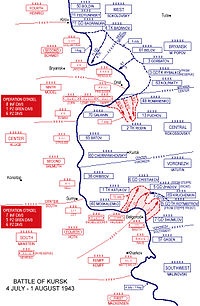
Battle of Kursk ends
Aug 23, 1943
% complete
The Battle of Kursk ends on August 23, 1943. It was a major confrontation between German and Soviet forces on the Eastern Front during World War II. The battle marked a turning point in the war as the Soviet Union successfully repelled the German offensive, leading to a series of Soviet counteroffensives that pushed the Germans back and initiated the long retreat to Berlin.
Invasion of Italy
Sep 3, 1943 - May 2, 1945
% complete
The Invasion of Italy was a military campaign during World War II that began on September 3, 1943, and ended on May 2, 1945. The invasion involved Allied forces, primarily from the United States and Great Britain, landing on the shores of Italy and advancing northward. The goal of the invasion was to remove Italy from the war and to open up a new front against Nazi Germany. The invasion was a challenging and costly operation, with difficult terrain, fierce resistance from German forces, and brutal fighting. Despite these challenges, the Allies were able to push through and liberate Italy.
Battle of Monte Cassino
Jan 17, 1944 - May 18, 1944
% complete
The Battle of Monte Cassino was a series of four assaults by the Allies against the Winter Line in Italy, held by Axis forces during World War II. The battle took place between January 17, 1944, and May 18, 1944. It was one of the longest and bloodiest engagements of the Italian Campaign.
Image source: Battle of Monte Cassino

Siege of Leningrad ends
Jan 27, 1944
% complete
The Siege of Leningrad was a prolonged military blockade by the German Army Group North against Leningrad, the capital city of the Soviet Union, during World War II. The siege lasted for 872 days, from September 1941 to January 1944. It resulted in the deaths of an estimated 1.5 million people, mostly from starvation.
Image source: Siege of Leningrad
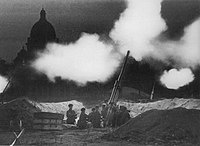
Battle of Monte Cassino ends
May 18, 1944
% complete
The Battle of Monte Cassino was a costly series of four assaults by the Allies against the Winter Line in Italy held by Axis forces during the Italian Campaign of World War II. The intention was a breakthrough to Rome. At the beginning of 1944, the western half of the Winter Line was being anchored by Germans holding the Rapido-Gari, Liri and Garigliano valleys and some of the surrounding peaks and ridges. Together, these features formed the Gustav Line. Monte Cassino, a historic hilltop abbey founded in AD 529 by Benedict of Nursia, dominated the nearby town of Cassino and the entrances to the Liri and Rapido valleys. Lying in a protected historic zone, it had been left unoccupied by the Germans, although they manned some positions set into the steep slopes below the abbey's walls. Repeated pinpoint artillery attacks on Allied assault troops caused their leaders to conclude the abbey was being used by the Germans as an observation post, at the least. Fears escalated along with casualties and in spite of a lack of clear evidence, it was marked for destruction. On 15 February American bombers dropped 1,400 tons of high explosives, creating widespread damage. The raid failed to achieve its objective, as German paratroopers then occupied the rubble and established excellent defensive positions amid the ruins.
D-Day
Jun 6, 1944
% complete
D-Day, also known as the Normandy landings, was the largest seaborne invasion in history. It took place on June 6, 1944, during World War II, as part of the Allied forces' efforts to liberate Western Europe from Nazi Germany's control. The operation involved more than 150,000 troops from the United States, United Kingdom, Canada, and other Allied countries landing on the beaches of Normandy, France. The invasion marked a turning point in the war and eventually led to the liberation of France and the defeat of Germany.
Image source: Normandy landings
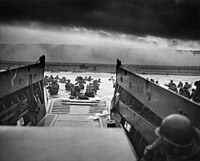
Operation Overlord
Jun 6, 1944
% complete
Operation Overlord was the codename for the Allied invasion of Normandy, France during World War II. It was launched on June 6, 1944, also known as D-Day. The operation involved the largest amphibious assault in history and aimed to establish a Western front in Europe to counter Germany. Over 150,000 troops from the United States, Britain, and Canada landed on the beaches of Normandy, facing heavy resistance from German forces. Despite initial setbacks, the Allies were able to secure a foothold in France and ultimately defeat the Axis powers.
Operation Overlord ends
Jun 6, 1944
% complete
Operation Overlord ends marks the successful invasion of Normandy by Allied forces during World War II. Under the command of General Dwight D. Eisenhower, the operation began on June 6, 1944, also known as D-Day, and lasted until late August 1944. The invasion involved the landing of troops from the United States, United Kingdom, Canada, and other Allied nations on the beaches of Normandy in northern France. The goal was to establish a foothold on the continent and ultimately liberate Western Europe from Nazi occupation. Despite initial difficulties and heavy casualties, the operation was a strategic success and marked a turning point in the war. It paved the way for the eventual defeat of Nazi Germany.
Image source: Operation Overlord

Warsaw Uprising
Aug 1, 1944 - Oct 2, 1944
% complete
The Warsaw Uprising was a major insurgency during World War II. It began on August 1, 1944, and lasted until October 2, 1944. It was an attempt by the Polish resistance to liberate Warsaw from German occupation. The uprising was ultimately unsuccessful, with the Germans suppressing the resistance and causing extensive damage to the city.
Image source: Warsaw Uprising
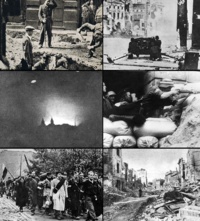
Liberation of Paris
Aug 25, 1944
% complete
The Liberation of Paris was a major event during World War II, taking place from August 19 to August 25, 1944. It marked the end of the German occupation of Paris and the restoration of French control. The liberation was a result of a successful military operation led by the French Resistance and supported by the Allied forces. The operation began with the uprising of the French Resistance factions in Paris on August 19, 1944, and was followed by days of intense fighting. On August 25, 1944, the German garrison in Paris surrendered, and the French flag was raised over the city. The Liberation of Paris boosted the morale of the French people and signified a turning point in the war, as it demonstrated the weakening of the German occupation and the imminent Allied victory. It was a crucial step towards the eventual liberation of France and the defeat of Nazi Germany.
Image source: Liberation of Paris
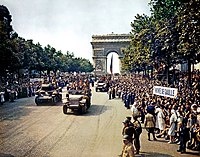
Warsaw Uprising ends
Oct 2, 1944
% complete
The Warsaw Uprising ends on October 2, 1944. It was a major operation by the Polish resistance Home Army to liberate Warsaw from German occupation during World War II. The uprising began on August 1, 1944, but after 63 days of intense fighting, the Polish resistance was forced to surrender. The German forces destroyed much of the city and expelled the civilian population. The Warsaw Uprising is considered one of the largest and most important resistance efforts of the war.
Battle of the Bulge
Dec 16, 1944 - Jan 25, 1945
% complete
The Battle of the Bulge was a major German offensive campaign on the Western Front during World War II. It took place from December 16, 1944 to January 25, 1945. The battle was the last major German offensive of the war and resulted in heavy casualties on both sides. The German objective was to split the Allied forces in the Ardennes region of Belgium and Luxembourg, creating a bulge in the front line that gave the battle its name. However, the Allies were able to hold their positions and eventually push the German forces back, effectively ending any realistic chance of German victory in the war.
Image source: Battle of the Bulge
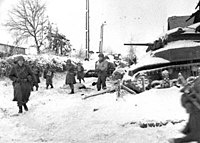
Battle of the Bulge ends
Jan 25, 1945
% complete
The Battle of the Bulge, one of the largest and bloodiest battles fought in World War II, ended on January 25, 1945. It was a major German offensive campaign launched towards the end of the war, aimed at dividing the Allied forces and capturing the port of Antwerp. The battle took place in the densely forested Ardennes region of Belgium, Luxembourg, and France. Despite initial success, the Germans were ultimately unable to withstand the Allied counterattacks, and their forces were pushed back. The Battle of the Bulge marked a significant turning point in the war, as it severely depleted German resources and morale, and allowed the Allied forces to regain the initiative.
Allied bombing of Dresden
Feb 13, 1945 - Feb 15, 1945
% complete
The Allied bombing of Dresden was a series of bombing raids carried out by the United States and the United Kingdom during World War II. The raids took place from February 13, 1945, to February 15, 1945, and targeted the city of Dresden, Germany. The bombing resulted in the destruction of much of the city and the loss of thousands of lives.
Image source: Bombing of Dresden in World War II
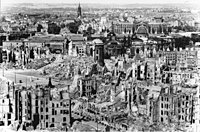
Bombing of Dresden ends
Feb 15, 1945
% complete
The bombing of Dresden was a strategic aerial bombing attack by the British Royal Air Force (RAF) and the United States Army Air Forces (USAAF) during World War II. The city of Dresden, the capital of the German state of Saxony, was heavily bombed by the Allies between 13 and 15 February 1945. The bombing was controversial because Dresden was neither important to German wartime production nor a major transportation center, and the attacks killed thousands of civilians. It is estimated that between 22,700 and 25,000 people were killed in the bombing, although some estimates put the number as high as 135,000. The bombing caused extensive damage to the city, reducing much of it to rubble. The attack on Dresden has been criticized as a war crime and an unnecessary destruction of a cultural and historical city.
Battle of Berlin
Apr 16, 1945 - May 2, 1945
% complete
The Battle of Berlin was the final major offensive of the European Theatre of World War II. It resulted in the capture of the German capital and the surrender of the German government. The battle began on April 16, 1945 and lasted until May 2, 1945. Soviet forces launched a massive assault on the city, with intense street-to-street fighting. The German forces, heavily outnumbered and weakened by years of war, fought desperately to defend the city. The battle ended with the complete defeat of the German forces and the suicide of Adolf Hitler.
Image source: Battle of Berlin
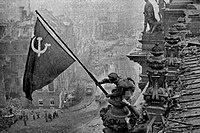
Battle of Berlin ends
May 2, 1945
% complete
The Battle of Berlin was the final major offensive of the European theater of World War II. It resulted in the capture of the German capital and the surrender of Nazi Germany. The battle lasted from April 20 to May 2, 1945.
Image source: Battle in Berlin

Battle of the Atlantic ends
May 8, 1945
% complete
The Battle of the Atlantic was a major naval campaign fought during World War II from 1939 to 1945. It was the longest, largest, and most complex naval battle in history. The battle took place in the Atlantic Ocean and saw the Allied forces, led by the United States, United Kingdom, and Canada, trying to defend their merchant shipping routes from attacks by German U-boats. The German U-boats, on the other hand, aimed to cut off vital supply lines and disrupt the flow of resources and troops to the Allies.
The battle finally ended on May 8, 1945, when Germany surrendered, marking the end of World War II in Europe. The Allied forces successfully managed to neutralize the German U-boat threat through a combination of tactics, technological advancements, and increased escort protection for merchant convoys. The victory in the Battle of the Atlantic played a crucial role in the ultimate triumph of the Allies in World War II.
Image source: Battle of the Atlantic
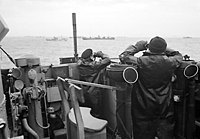
Pacific Theater
Attack on Pearl Harbor
Dec 7, 1941
% complete
The Attack on Pearl Harbor was a surprise military strike by the Imperial Japanese Navy Air Service against the United States naval base at Pearl Harbor, Hawaii Territory, on the morning of December 7, 1941. The attack led to the United States' entry into World War II.
Image source: Attack on Pearl Harbor
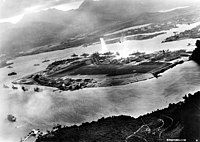
Battle of the Coral Sea
May 4, 1942 - May 8, 1942
% complete
The Battle of the Coral Sea was a major naval battle fought between the Imperial Japanese Navy and naval and air forces from the United States and Australia. It took place from May 4 to May 8, 1942, in the Pacific Theater of World War II. The battle was significant as it was the first time in history that two opposing naval forces engaged in combat without directly sighting each other. Instead, the battle was fought entirely through aircraft carrier-based planes, marking a new era in naval warfare. The battle ultimately resulted in a tactical victory for the Japanese, as they sank more Allied ships than they lost, but it was a strategic victory for the Allies. This was because the battle halted the Japanese advance towards Australia and prevented them from seizing Port Moresby, which would have threatened Allied positions in the Pacific.
Image source: Battle of the Coral Sea
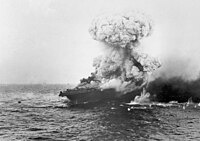
Battle of the Coral Sea ends
May 8, 1942
% complete
The Battle of the Coral Sea ends on May 8, 1942. It was a major naval battle fought between the Japanese Imperial Navy and the United States Navy and Royal Australian Navy. The battle took place in the Coral Sea, northeast of Australia. It was the first battle in history where the opposing ships did not make direct contact with each other. Instead, the battle was fought primarily by aircraft. The result of the battle was a tactical victory for the Japanese, as they sank more Allied ships and achieved their immediate objectives. However, it was a strategic victory for the Allies, as it halted the Japanese advance towards Port Moresby and prevented them from capturing important strategic positions in the South Pacific.
Battle of Midway
Jun 4, 1942 - Jun 7, 1942
% complete
The Battle of Midway was a decisive naval battle in the Pacific Theater of World War II. It took place from June 4 to 7, 1942, and was fought between the United States and Imperial Japan. The battle marked a turning point in the war, as the United States successfully defended Midway Atoll from the Japanese and inflicted significant damage on their fleet. This victory gave the United States the strategic initiative in the Pacific and paved the way for their subsequent offensive operations.
Image source: Battle of Midway
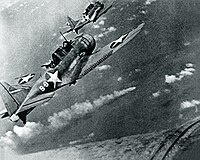
Battle of Midway ends
Jun 7, 1942
% complete
The Battle of Midway was a decisive naval battle in the Pacific Theater of World War II. The battle took place between June 4th and June 7th, 1942, six months after the Japanese attack on Pearl Harbor. The United States Navy defeated a Japanese attack against Midway Atoll, marking a turning point in the war in the Pacific. The battle resulted in the loss of four Japanese aircraft carriers and a significant loss of experienced pilots, while the United States only lost one aircraft carrier. The victory at Midway allowed the United States to gain the strategic initiative and go on the offensive against Japan.
Battle of Guadalcanal
Aug 7, 1942 - Feb 9, 1943
% complete
The Battle of Guadalcanal was a major battle between the Allied forces and the Empire of Japan during World War II. It started on August 7, 1942, and ended on February 9, 1943. The battle took place on the island of Guadalcanal in the Solomon Islands, in the South Pacific Ocean. It was the first major offensive action by the Allies against the Empire of Japan and marked a turning point in the war in the Pacific. The battle involved intense ground, naval, and air combat, and resulted in heavy casualties on both sides. Ultimately, the Allies were able to secure control of Guadalcanal, which played a crucial role in the overall Allied strategy to defeat Japan.
Battle of Guadalcanal begins
Aug 7, 1942
% complete
The Battle of Guadalcanal begins on August 7, 1942. It was a major campaign in the Pacific theater of World War II. The United States and its allies launched an amphibious assault on the island of Guadalcanal, which was held by the Japanese. The battle lasted for several months and resulted in a decisive victory for the Allied forces. The capture of Guadalcanal provided a strategic base for further operations in the Pacific, and it marked a turning point in the war.
Battle of Guadalcanal ends
Feb 9, 1943
% complete
The Battle of Guadalcanal ends on February 9, 1943. It was a major battle between the Allied forces, mainly from the United States, and the Empire of Japan. The battle took place on the island of Guadalcanal in the Pacific theater of World War II. It lasted for six months, from August 7, 1942, to February 9, 1943. The Allied forces were able to successfully repel the Japanese forces and secure Guadalcanal, marking a turning point in the war in the Pacific.
Image source: Guadalcanal campaign
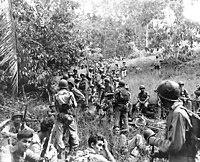
Battle of Leyte Gulf
Oct 23, 1944 - Oct 26, 1944
% complete
The Battle of Leyte Gulf was the largest naval battle of World War II. It took place near the island of Leyte in the Philippines from October 23 to October 26, 1944. The battle involved the Allied forces, primarily the United States and Australia, against the Imperial Japanese Navy. The objective of the battle was to secure the island of Leyte and establish a base for further operations in the Philippines. The Allied forces successfully defeated the Japanese fleet, thereby preventing a major disruption to their operations in the Pacific theater.
Battle of Leyte Gulf ends
Oct 26, 1944
% complete
The Battle of Leyte Gulf was fought in the Pacific Theater of World War II, and was the largest naval battle of the war. The battle occurred from October 23 to October 26, 1944, and took place in the waters off the island of Leyte in the Philippines. It was a decisive victory for the Allied forces, led by the United States, over the Imperial Japanese Navy. The battle resulted in the destruction of much of the Japanese fleet, and marked a significant turning point in the war in the Pacific.
Image source: Battle of Leyte Gulf
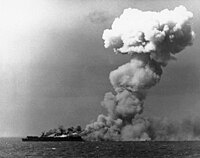
Battle of Iwo Jima
Feb 19, 1945 - Mar 26, 1945
% complete
The Battle of Iwo Jima was a major battle in which the United States Marine Corps fought against the Imperial Japanese Army. The battle took place from February 19 to March 26, 1945, during the final stages of World War II. The objective of the battle was to capture the island of Iwo Jima, which was strategically important for the Allies as it provided a military airfield and a base for launching air attacks against the Japanese mainland. The battle resulted in a decisive victory for the United States, although it was one of the bloodiest battles in Marine Corps history with heavy casualties on both sides. The iconic photograph of the raising of the American flag on Mount Suribachi during the battle has become one of the most recognizable images of the war.
Battle of Iwo Jima ends
Mar 26, 1945
% complete
The Battle of Iwo Jima was a major battle fought between the United States and Japan during World War II. It took place from February 19 to March 26, 1945, and was one of the fiercest and bloodiest battles of the war. The objective of the battle was for the United States to capture the island of Iwo Jima, which was heavily fortified by the Japanese. After weeks of intense fighting and heavy casualties on both sides, the battle ended on March 26, 1945, with the United States successfully capturing the island.
Image source: Battle of Iwo Jima
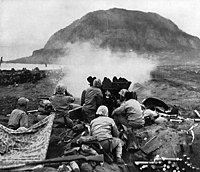
Battle of Okinawa
Apr 1, 1945 - Jun 22, 1945
% complete
The Battle of Okinawa was a major battle fought during World War II between April 1 and June 22, 1945. It was the largest amphibious assault in the Pacific theater of World War II and the last major battle of the war. The battle was fought on the island of Okinawa in the Ryukyu Islands, located between Japan and Taiwan. The American forces, primarily consisting of the U.S. Army and U.S. Marine Corps, launched a massive invasion of the island, facing strong resistance from the Japanese Imperial Army. The battle resulted in heavy casualties for both sides, with tens of thousands of soldiers and civilians killed. The U.S. forces eventually emerged victorious and secured control of Okinawa, which served as a crucial base for the planned invasion of Japan. The battle is remembered for its fierce combat and the large number of kamikaze attacks by Japanese pilots, who deliberately crashed their planes into American ships in an attempt to inflict maximum damage. The Battle of Okinawa played a significant role in the eventual surrender of Japan and the end of World War II.
Image source: Battle of Okinawa
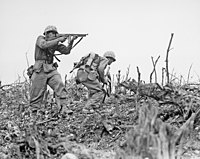
Battle of Okinawa ends
Jun 22, 1945
% complete
The Battle of Okinawa ends on June 22, 1945. It was the largest amphibious assault of the Pacific War and lasted for about three months. The battle was fought between the United States and Japanese forces for control of the island of Okinawa, which was a crucial strategic location. The United States emerged victorious, but at a high cost, with heavy casualties on both sides. The battle is significant because it provided a base for the subsequent bombings of Japan and played a role in the decision to use atomic bombs to end the war.
Bombing of Hiroshima
Aug 6, 1945
% complete
On August 6, 1945, during World War II, an American B-29 bomber named Enola Gay dropped an atomic bomb on the city of Hiroshima, Japan. The bomb, called 'Little Boy', exploded with a force equivalent to 15,000 tons of TNT, instantly killing an estimated 70,000-80,000 people and causing widespread destruction. The bombing of Hiroshima marked the first use of an atomic bomb in warfare and remains one of the deadliest and most controversial events in history.
Bombing of Nagasaki
Aug 9, 1945
% complete
The Bombing of Nagasaki was the second and last nuclear attack during World War II. On August 9, 1945, a plutonium implosion-type bomb was dropped on the city of Nagasaki, Japan by the United States. The bomb killed an estimated 40,000 people immediately, with thousands more dying later from the effects of radiation. The bombing of Nagasaki played a significant role in Japan's decision to surrender, ultimately leading to the end of World War II.
Image source: Atomic bombings of Hiroshima and Nagasaki
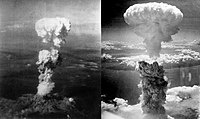
Post-War Events
Yalta Conference
Feb 4, 1945 - Feb 11, 1945
% complete
The Yalta Conference was a meeting between the leaders of the United States, the Soviet Union, and the United Kingdom in Yalta, Crimea. It took place from February 4 to February 11, 1945. The purpose of the conference was to discuss the post-war reorganization of Europe and the establishment of a new international organization, which would later become the United Nations. The three main leaders at the conference were Franklin D. Roosevelt, Winston Churchill, and Joseph Stalin. They made significant decisions regarding the future of Germany, including its division into four zones of occupation and the holding of war crimes trials. The conference also resulted in an agreement on the reestablishment of Soviet control over Eastern Europe and the recognition of the Soviet Union's territorial gains in World War II.
Image source: Yalta Conference
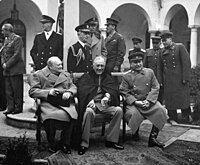
Potsdam Conference
Jul 17, 1945 - Aug 2, 1945
% complete
The Potsdam Conference was a meeting between the leaders of the Allied forces - the Soviet Union, the United States, and the United Kingdom - to discuss the post-war reorganization of Europe. It took place in Potsdam, Germany, from July 17 to August 2, 1945. The conference addressed issues such as the occupation of Germany, war reparations, the establishment of democratic governments in Eastern Europe, and the prosecution of war criminals. The Potsdam Conference marked the beginning of the Cold War between the Soviet Union and the Western powers.
Image source: Potsdam Conference
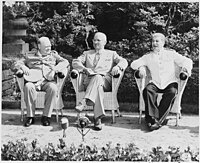
Hirohito announces Japan's surrender
Aug 15, 1945
% complete
On August 15, 1945, Emperor Hirohito of Japan announced Japan's surrender in a radio broadcast. This came after the atomic bombings of Hiroshima and Nagasaki and the Soviet Union's entry into the war against Japan. The announcement marked the end of World War II in the Pacific and the official surrender of Japan, which was formally signed on September 2, 1945, aboard the USS Missouri in Tokyo Bay.
Image source: Hirohito surrender broadcast

United Nations founded
Oct 24, 1945
% complete
The United Nations is founded as an international organization to promote peace, security, and cooperation among nations. It replaces the League of Nations and consists of 51 member countries at the time of its establishment. The founding document, the United Nations Charter, is signed on June 26, 1945, by representatives from 50 countries. The United Nations officially comes into existence on October 24, 1945, when the charter is ratified by its founding members.
Nuremberg Trials begin
Nov 20, 1945 - Oct 1, 1946
% complete
The Nuremberg Trials were a series of military tribunals held after World War II to prosecute prominent leaders of Nazi Germany. The trials were held in the German city of Nuremberg from November 20, 1945, to October 1, 1946. The purpose of the trials was to hold individuals accountable for war crimes, crimes against humanity, and other atrocities committed during the war. The defendants included high-ranking Nazi officials, military officers, and members of the SS. The trials set a precedent for international law and established the principle that individuals can be held responsible for their actions, even during times of war. The Nuremberg Trials brought attention to the Holocaust and the extent of Nazi crimes, helping to shape public opinion and pave the way for future trials and the establishment of the International Criminal Court.
Key Facts
- World War II began on September 1, 1939, when Germany invaded Poland.
- The United States entered the war after the Japanese attack on Pearl Harbor on December 7, 1941.
- On June 6, 1944, Allied forces launched the D-Day invasion of Normandy, France, turning the tide of the war.
- The war in Europe ended on May 7, 1945, with the unconditional surrender of Germany.
- The war in the Pacific ended on August 15, 1945, with Japan's surrender following the atomic bombings of Hiroshima and Nagasaki.
Source
This World War II timeline was generated with the help of AI using information found on the internet.
We strive to make these timelines as accurate as possible, but occasionally inaccurates slip in. If you notice anything amiss, let us know at [email protected] and we'll correct it for future visitors.
Create a timeline like this one for free
Preceden lets you create stunning timelines using AI or manually.
Customize your timeline with one of our low-cost paid plans
Export your timeline, add your own events, edit or remove AI-generated events, and much more
Free
$
0
free forever
No credit card required.
Basic
$
10
/month
billed annually
Cancel anytime.
Pro
$
16
/month
billed annually
Cancel anytime.
Common Questions
Can I cancel anytime?
Yes. You can cancel your subscription from your account page at anytime which will ensure you are not charged again. If you cancel you can still access your subscription for the full time period you paid for.
Will you send an annual renewal reminder?
Yes, we will email you a reminder prior to the annual renewal and will also email you a receipt.
Do you offer refunds?
Yes. You can email us within 15 days of any payment and we will issue you a full refund.
What if I have more questions?
Check out our pricing docs or send us an email anytime: [email protected].